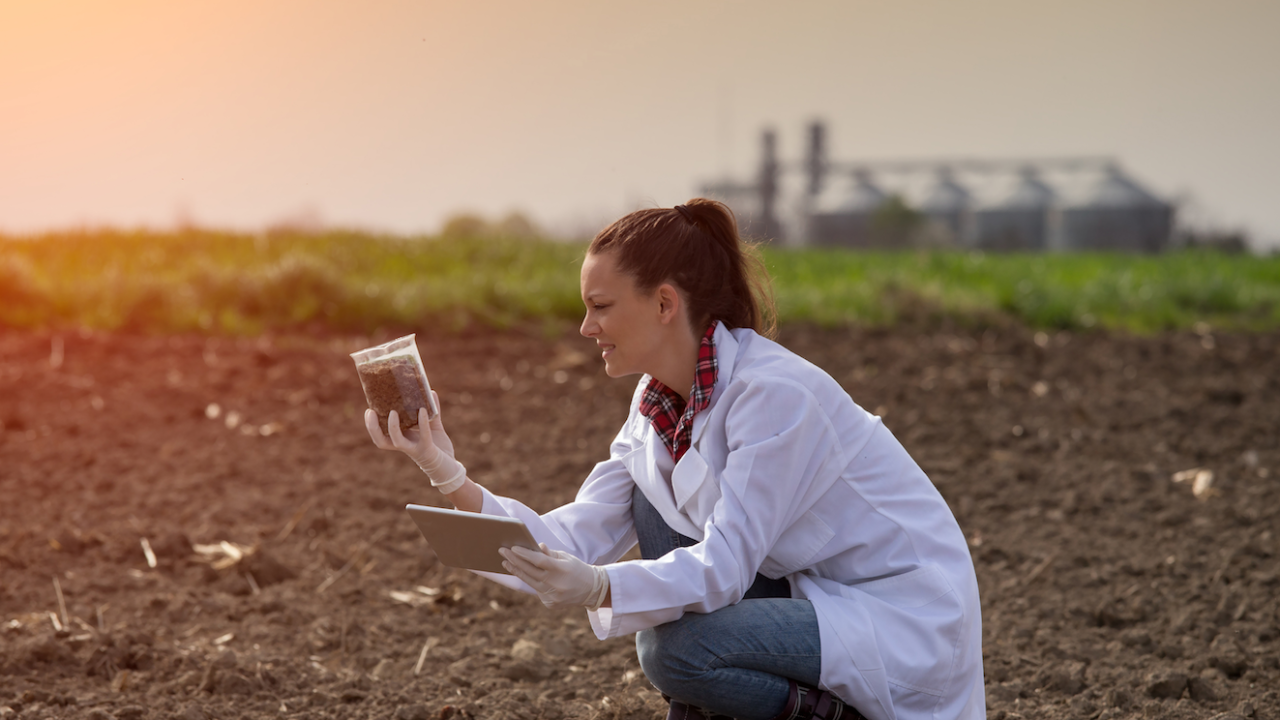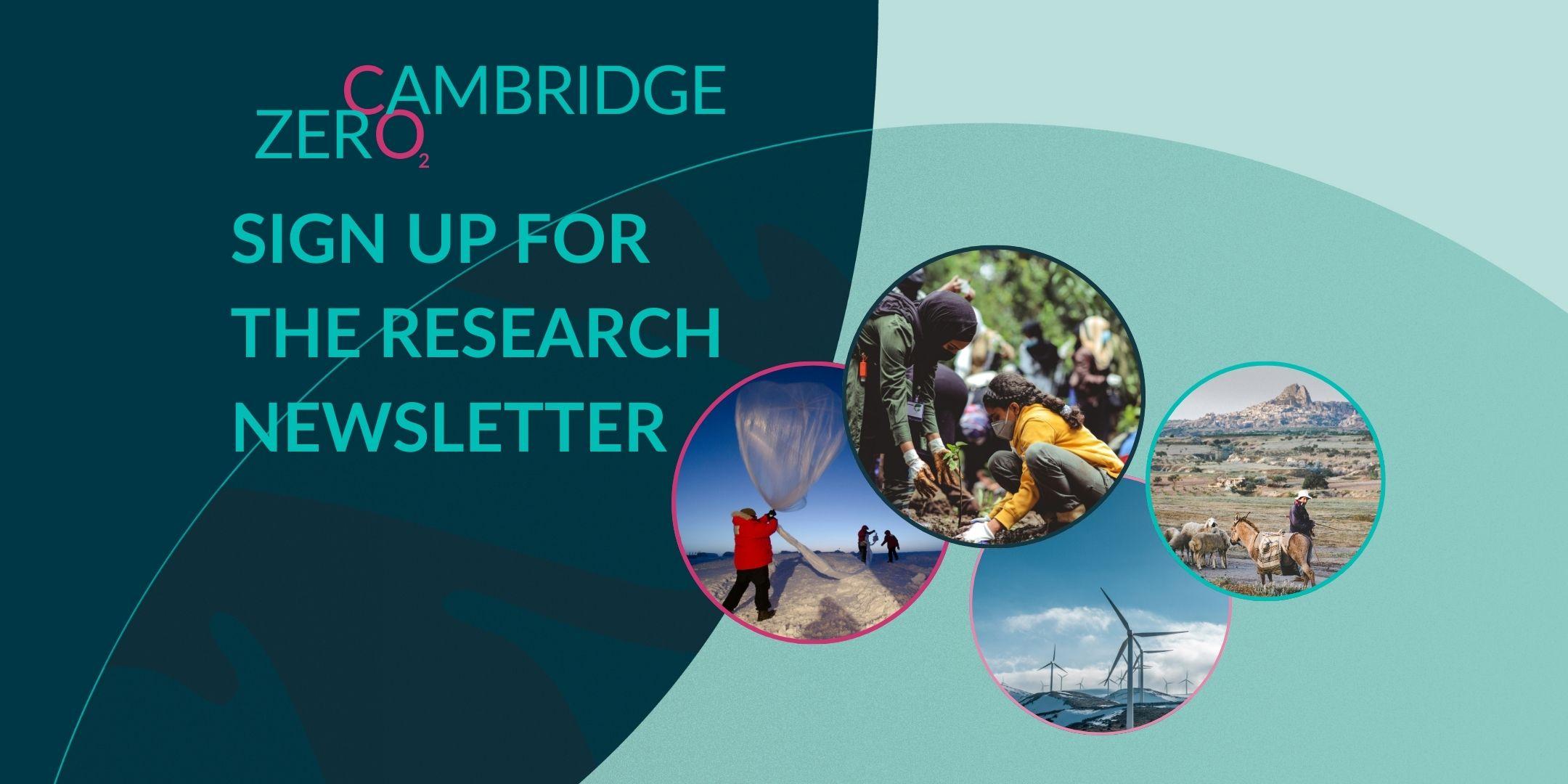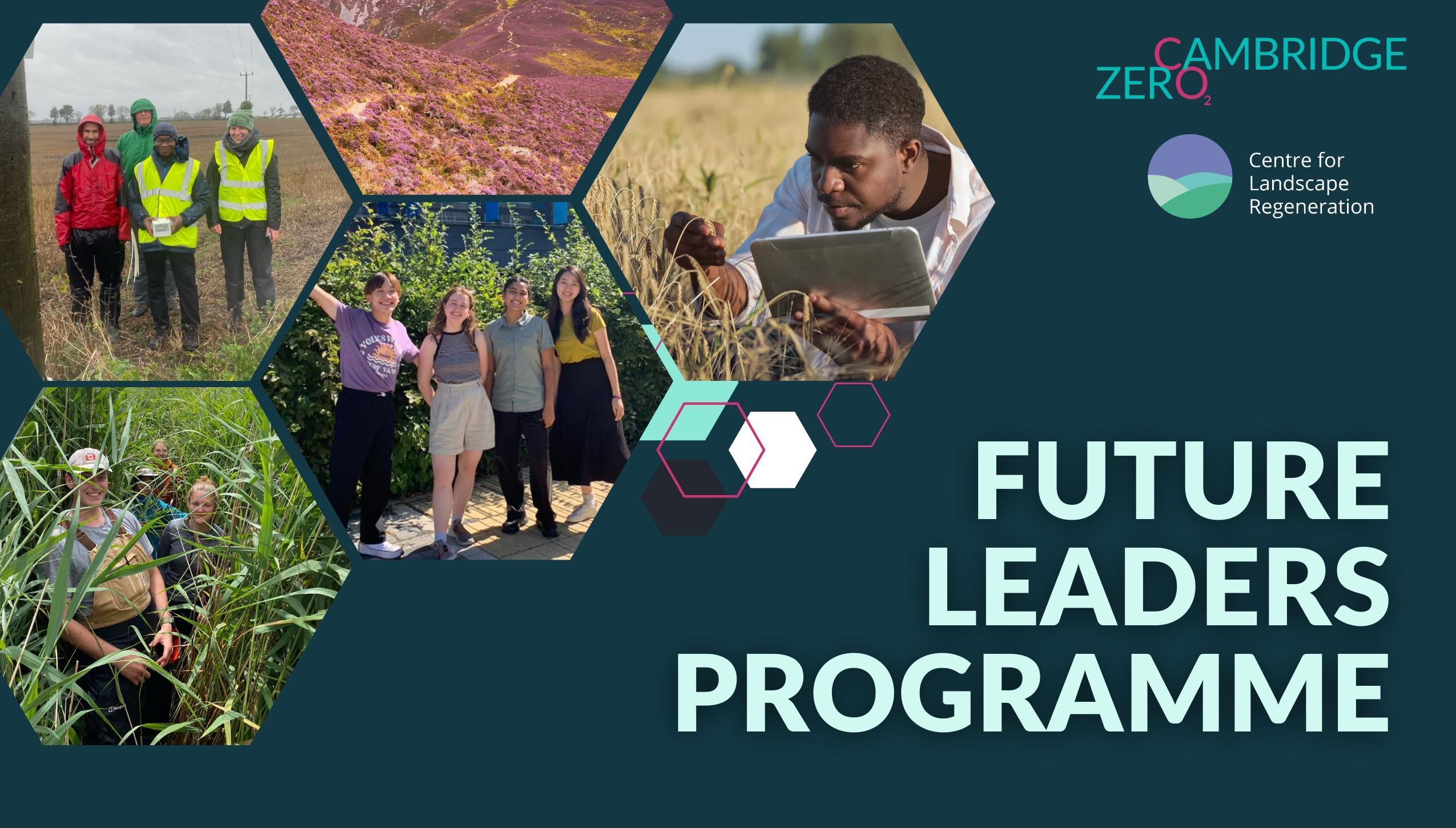The Future Leaders Programme is run by Cambridge Zero in collaboration this year with the Centre for Landscape Regeneration. This page details the three paid summer project assistantships offered by the Centre for Landscape Regeneration. If you’d like to find out more about the roles available with Cambridge Zero, please see here.
Future Leaders Programme - Centre for Landscape Regeneration
This summer, Cambridge Zero and the Centre for Landscape Regeneration are collaborating to offer seven paid project assistant positions to undergraduates and recent graduates. These roles present an opportunity to get involved with these organisations at a critical time for climate and environmental issues globally. Project assistants will be given the opportunity to gain experience of working on current research in climate change, biodiversity and environmental science in an impactful way.
Within the Centre for Landscape Regeneration, the available positions are as follows:
These three project assistantships are funded by the Centre for Landscape Regeneration and NERC in line with the NERC Diversity and Inclusion Living Action Plan . This opportunity aims to improve diversity and inclusion in environmental sciences, for this reason, we would particularly welcome applications from those:
-
identifying as belonging to an underrepresented ethnic group.
-
granted refugee status in the UK.
-
mature students.
-
have received free school meals.
-
at the time of applying for their undergraduate course, were living in one of the most deprived areas of the country.
-
at the time of applying for their undergraduate course, were living in an area where it is unusual for young people to go to university.
-
were the first generation of their family to go to university.
-
entered university at undergraduate level from a Care background
-
estranged from their family.
-
have caring responsibilities for an ill or disabled family member who could not manage without this help.
-
who have been a single parent, or lone guardian of a young person who is aged under 18 and/or still in full-time education during their undergraduate degree course.
-
received full state support for maintenance for their course of undergraduate study.
Details:
-
These positions are for current undergraduates, or candidates who have graduated from an undergraduate degree in the last year.
-
Please note we cannot offer sponsorship for this role as it does not meet the minimum salary requirements to obtain a Skilled Worker Visa.
-
The positions are open to ALL undergraduate students, not just students from the University of Cambridge.
-
The Future Leaders Programme runs for 8 weeks, from 17 July to 15 September.
-
These roles are paid the Cambridge Real Living Wage, at a rate of £10.90ph, administered via the Temporary Employment Service. Project assistants will work 37 hours per week over 8 weeks.
-
The Centre for Landscape Regeneration project assistantships are fully in person, as they involve lab and fieldwork. Project assistants are expected to be in the Cambridge area for the duration of the 8 weeks.
-
Project assistants will need to be resident in the UK for the duration of the programme.
-
All project assistants will have a line manager who will provide mentoring and guidance on the project. They may also receive support from other staff and contacts outside of the University.
-
All project assistants will be required to produce a high-quality written report at the end of the 8-week programme summarising their work. They will also be required to present this to the Centre for Landscape Regeneration and Cambridge Zero wider teams.
-
You are welcome to apply to more than one position, but you can only be accepted for one.
The final deadline for applications is 9am on 27 March. Interviews will be held online in the week commencing 17 April.
How to apply
Please fill out the application form listed with each role by 9am on Monday 27 March. If you have any questions, please contact elizabeth.simpson@admin.cam.ac.uk
Greenhouse Gas and Soil (Earth Sciences) Project Assistant
The addition of organic matter to soils in an attempt to enhance carbon storage is a common practice on fenland farms. The impact of this practice on the production and consumption of greenhouse gases has not been well established, however. Understanding the impact of this, and the addition of fertilisers, is crucial to our ability to make predictions and recommendations for the best management practices for fenland land.
The project assistant will investigate the effect of chemical additives on the production and consumption of greenhouse gases by fenland peat under aerated and waterlogged conditions. Soil additives that could be investigated include fertilisers (commercial fertiliser, nitrate, ammonium, phosphate, potassium, etc.), organic matter (compost, lactate, acetate, etc.), or alternative additives that have been suggested for their potential to reduce methane emissions (sulfate, iron oxides, etc.).
The assistant will be trained in the measurement of greenhouse gas concentrations (carbon dioxide, methane, and nitrous oxide) and carbon isotopic compositions using laser instruments (e.g., cavity ringdown spectrometer). The assistant will principally help with the management of a series of incubation experiments and will be trained to manage those experiments appropriately.
There will also be opportunities for the assistant to participate in field sampling in the Fens and to assist with and learn about a number of other analytical techniques (UV-VIS spectrometry, ion chromatography, etc.). There is scope within this project for the assistant to direct the specific focus of their project to align with their own interests.
The Project Assistant will be taught throughout the project about the role of microbial communities in controlling the production and consumption of greenhouse gases in soils. Time allowing, there may be scope for the assistant to help with the interpretation and presentation of the data they measure. The data produced in this project has the potential to contribute to future publications.
The assistant will gain a deep understanding of chemical and biochemical processes in soils, especially peat, and in freshwater environments more broadly. They will also develop skills in chemical analysis, field sampling, experiment management and computing.
The project will be hosted in the Department of Earth Sciences and supervised by Thomas Marquand and Prof. Sasha Turchyn.
Person specification:
This opportunity aims to improve diversity and inclusion in environmental sciences, for this reason, we would particularly welcome applications from underrepresented groups. See above for more details on this.
Applicants must have…
-
a knowledge of climate and environmental issues as well as a passion for the subject.
-
good analytical skills; able to collate, understand and draw conclusions from quantitative information.
-
good interpersonal skills; confident in meeting and working with people from a range of backgrounds and disciplines.
-
well-developed organisational skills and the ability to establish and manage projects and the ability to prioritise own workload.
-
competence in standard software packages, e.g., Word, Excel, PowerPoint.
Applicants would benefit from…
-
good presentation and report-writing skills.
-
basic knowledge of computer coding.
-
interest in and knowledge about sustainable land management and farming.
-
experience working in a scientific lab (e.g., from their degree).
-
knowledge of chemistry, microbiology, physical geography, or related fields.
-
A willingness to travel to remote field sites and work outdoors in the Fens is essential for this role.
-
A UK driving licence for more than two years would be beneficial but is not essential.
Please note we cannot offer sponsorship for this role as it does not meet the minimum salary requirements to obtain a Skilled Worker Visa.
All applicants must be undergraduate students who are current or recent students (graduated from their undergraduate degree within the last year).
Application form: https://forms.office.com/e/FhpXApQUjN
Application deadline: Please submit completed application forms before 9am on Monday 27 March
Bacteria and Fungi in Soils (Plant Sciences) Project Assistant
The peatlands of Cambridgeshire, commonly known as the Fens, used to be a lush wetland bursting with biodiversity. They were storing gigatons of carbon in soils due to the incomplete degradation of plant-derived organic matter. Nowadays, most of the Fens have been drained and replaced by agricultural fields. The loss of the natural Fens reduced biodiversity and released gigatons of carbon into the atmosphere. Multiple factors are thought to influence the amount of carbon released by the Fens. However, they all involve microbial activities. Microbes are the most abundant organisms in the Fens, and they degrade different compounds depending on their phylogeny. Fungi degrade large plant-derived compounds and leave behind simpler compounds that are degraded by bacteria. Ecosystems containing more fungi are therefore degrading more plant-derived, thereby inducing higher peat mineralization. Estimating the structure of microbial communities is then essential before undertaking any restoration initiative in the Fens.
Within the Centre for Landscape Regeneration (https://www.clr.conservation.cam.ac.uk/), the Project Assistant will contribute to a large, multimillion-pound consortium aiming to regenerate the Fens. They will join a team focussing on identifying the drivers of peat degradation. They will participate in a field survey where they will collect and characterize soils within the Fen. Then, they will determine the abundance of fungi and bacteria using fluorescent dyes. They will use both epifluorescence microscopy and flow cytometry. They will ensure both methods give identical results with an important part of the project consisting of optimizing the flow cytometry protocol for the enumeration of fungi. Then, the Project Assistant will correlate fungi and bacteria abundances with soil characteristics to identify potential drivers of microbial abundances.
The project will be hosted within the Department of Plant Sciences and supervised by Dr Jeremy Fonvielle.
Person specification:
This opportunity aims to improve diversity and inclusion in environmental sciences, for this reason, we would particularly welcome applications from underrepresented groups. See above for more details on this.
Applicants must have…
-
a knowledge of climate and environmental issues as well as a passion for the subject.
-
good analytical skills; able to collate, understand and draw conclusions from quantitative information.
-
good interpersonal skills; confident in meeting and working with people from a range of backgrounds and disciplines.
-
well-developed organisational skills and the ability to establish and manage projects and the ability to prioritise own workload.
-
competence in standard software packages, e.g., Word, Excel, PowerPoint.
Applicants would benefit from…
-
good presentation and report-writing skills.
-
experience using epifluorescence microscopes or flow cytometers
-
A willingness to travel to remote field sites and work outdoors in the Fens is essential for this role.
-
A UK driving licence for more than two years would be beneficial but is not essential.
Please note we cannot offer sponsorship for this role as it does not meet the minimum salary requirements to obtain a Skilled Worker Visa.
All applicants must be undergraduate students who are current or recent students (graduated from their undergraduate degree within the last year).
Application form: https://forms.office.com/e/Mi08N46Jdn
Application deadline: Please submit completed application forms before 9am on Monday 27 March
Biodiversity of Bees Project Assistant
This project will compare the diversity and abundance of pollinators (bees) and/or earthworms between sites employing different regenerative practices in the Cambridgeshire Fens. It will add depth to the ongoing biodiversity work already happening in the Fens as part of the Centre for Landscape Regeneration (CLR), which currently surveys the responses of birds, bats, beetles, dragonflies, butterflies and moths to various regenerative practices in the Fens, from regenerative agricultural techniques through paludiculture to fenland and reedbed restoration.
Two groups that farmers and conservationists alike are particularly interested in and are good indicators of a healthy environment, but are not currently surveyed in this project, are pollinators and earthworms. The purpose of this project will be to fill this knowledge gap and collect field-scale data over the summer on the abundance and diversity of these taxa at sites with different land uses.
The Project Assistant will undertake fieldwork alongside other CLR biodiversity fieldworkers for approximately eight days per month, wherein they will be collecting pollinators with pan traps and/or earthworms with soil cores from a variety of habitats and locations. The Project Assistant will then spend time in the lab counting, identifying, and pinning these collected specimens and will prepare a short report comparing the diversity and abundance of these groups between habitat types and in response to specific regenerative practices.
The Project Assistant will learn skills in the collection, identification and preparation of biodiversity samples and field data and potentially also statistical analyses.
This project is important for sustainability and net zero as current farming practices in the Fens produce a large amount of carbon and soil loss from the organic, peaty soils, and regenerative practices are hoped to alleviate some of this, as well as providing benefits for biodiversity, and identifying the responses of biodiversity to these practices is key to understanding what impact this will have.
The project will be hosted by the Department of Zoology and supervised by Dr Jack Shutt and Prof Lynn Dicks.
Person specification:
This opportunity aims to improve diversity and inclusion in environmental sciences, for this reason, we would particularly welcome applications from underrepresented groups. See above for more details on this.
Applicants must have:
-
a knowledge of climate and environmental issues as well as a passion for the subject.
-
experience in biodiversity fieldwork, and preference will be given to those with species identification experience (in any taxonomic group, not necessarily the groups to be studied).
-
Well-developed organisational skills and the ability to establish and manage projects and the ability to prioritise own workload.
-
good analytical skills; able to collate, understand and draw conclusions from quantitative information.
-
good interpersonal skills; confident in meeting and working with people from a range of backgrounds and disciplines.
-
competence in standard software packages, e.g., Word, Excel, PowerPoint.
Applicants would benefit from:
-
A strong interest in invertebrates (either pollinators or earthworms) in agricultural landscapes
-
good presentation and report-writing skills.
-
A willingness to travel to remote field sites and work outdoors in the Fens is essential for this role.
-
A UK driving licence for more than two years would be beneficial but is not essential.
Please note we cannot offer sponsorship for this role as it does not meet the minimum salary requirements to obtain a Skilled Worker Visa.
All applicants must be undergraduate students who are current or recent students (graduated from their undergraduate degree within the last year).
Application form: https://forms.office.com/e/ZMTVXVzsjB
Application deadline: Please submit completed application forms before 9am on Monday 27 March



